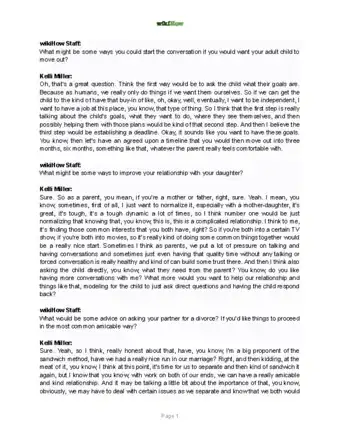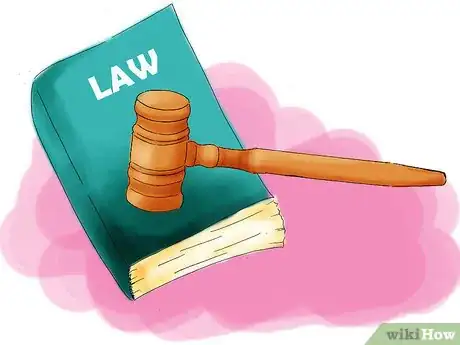This article was co-authored by Kelli Miller, LCSW, MSW. Kelli Miller is a Psychotherapist based in Los Angeles, California. Kelli specializes in individual and couples therapy focusing on relationships, depression, anxiety, sexuality, communication, parenting, and more. Kelli also facilitates groups for those struggling with alcohol and drug addiction as well as anger management groups. She is the author of “Professor Kelli’s Guide to Finding a Husband” and the award-winning and best-selling book “Thriving with ADHD”. Kelli co-hosted an advice show on LA Talk Radio and is a relationship expert for The Examiner. She received her MSW (Masters of Social Work) from the University of Pennsylvania and a BA in Sociology/Health from the University of Florida.
There are 7 references cited in this article, which can be found at the bottom of the page.
wikiHow marks an article as reader-approved once it receives enough positive feedback. In this case, several readers have written to tell us that this article was helpful to them, earning it our reader-approved status.
This article has been viewed 425,038 times.
The end of a marriage can be devastating, and it’s perfectly reasonable if you’re upset during this tumultuous time. But you can and will get through this. It makes sense that you’d want to go through this divorce with your ex as calmly and amicably as possible. In this article, we’ll show you how to navigate this process with tact, respect, and care.
Steps
Expert Q&A
-
QuestionWhat do you say when leaving a marriage?
 Kelli Miller, LCSW, MSWKelli Miller is a Psychotherapist based in Los Angeles, California. Kelli specializes in individual and couples therapy focusing on relationships, depression, anxiety, sexuality, communication, parenting, and more. Kelli also facilitates groups for those struggling with alcohol and drug addiction as well as anger management groups. She is the author of “Professor Kelli’s Guide to Finding a Husband” and the award-winning and best-selling book “Thriving with ADHD”. Kelli co-hosted an advice show on LA Talk Radio and is a relationship expert for The Examiner. She received her MSW (Masters of Social Work) from the University of Pennsylvania and a BA in Sociology/Health from the University of Florida.
Kelli Miller, LCSW, MSWKelli Miller is a Psychotherapist based in Los Angeles, California. Kelli specializes in individual and couples therapy focusing on relationships, depression, anxiety, sexuality, communication, parenting, and more. Kelli also facilitates groups for those struggling with alcohol and drug addiction as well as anger management groups. She is the author of “Professor Kelli’s Guide to Finding a Husband” and the award-winning and best-selling book “Thriving with ADHD”. Kelli co-hosted an advice show on LA Talk Radio and is a relationship expert for The Examiner. She received her MSW (Masters of Social Work) from the University of Pennsylvania and a BA in Sociology/Health from the University of Florida.
Psychotherapist Try using the sandwich method! Start with a comment like "We've had a really nice run in our marriage," followed by "I think at this point, it's time for us to separate." Complete the "sandwich" with a comment like "We may have to deal with certain issues as we separate, but let's make an agreement to kind to one another and make this process as simple as possible."
Try using the sandwich method! Start with a comment like "We've had a really nice run in our marriage," followed by "I think at this point, it's time for us to separate." Complete the "sandwich" with a comment like "We may have to deal with certain issues as we separate, but let's make an agreement to kind to one another and make this process as simple as possible." -
QuestionCan I get divorced without a lawyer?
 Community AnswerYes. There are do it yourself kits assuming you both agree to everything and no children are involved.
Community AnswerYes. There are do it yourself kits assuming you both agree to everything and no children are involved. -
QuestionHow can I become more positive about my divorce?
 Community AnswerGive yourself time to grieve over the loss of your marriage and partner. Being on your own will give you a chance to get in touch with who you really are, and allow you to pursue new independent interests, even reinvent yourself. Redefine the characteristics that you're looking for in a relationship. Check online groups such as Meetup.com for events in your area, and pursue meeting new people. This is an emotionally turbulent time, but also exciting, allowing you the opportunity to make changes in your life as you open a new chapter.
Community AnswerGive yourself time to grieve over the loss of your marriage and partner. Being on your own will give you a chance to get in touch with who you really are, and allow you to pursue new independent interests, even reinvent yourself. Redefine the characteristics that you're looking for in a relationship. Check online groups such as Meetup.com for events in your area, and pursue meeting new people. This is an emotionally turbulent time, but also exciting, allowing you the opportunity to make changes in your life as you open a new chapter.
Warnings
- If you feel suicidal during a divorce, get help immediately. This is a hard time but it's never worth killing yourself over.⧼thumbs_response⧽
- If communications become deadlocked during a divorce, things can go from a desire to be reasonable and amicable to being downright nasty and pigheaded. It is easy to get caught up in this negative spiral as a result of your own negative emotions. Do your best to step aside from the nasty tactics though. One way to help might be to employ a mediator, especially in relation to dividing finances and property. This neutral person can remove much of the emotion, exhaustion, and anger and can move between the two of you without taking sides.⧼thumbs_response⧽
Things You'll Need
- A good lawyer
- Your own space to get yourself back together again
- Lists of thoughts, ideas, and discussion points
Expert Interview

Thanks for reading our article! If you'd like to learn more about divorce, check out our in-depth interview with Kelli Miller, LCSW, MSW.
References
- ↑ https://www.psychologytoday.com/us/blog/tech-support/201506/notes-my-divorce-5-coping-strategies-worked
- ↑ https://www.law.cornell.edu/wex/divorce
- ↑ https://psychcentral.com/lib/reduce-the-stress-of-a-divorce/
- ↑ https://www.apa.org/helpcenter/healthy-divorce
- ↑ https://www.psychologytoday.com/ie/blog/love-doc/201906/coping-divorce
- ↑ https://www.psychologytoday.com/us/blog/the-intelligent-divorce/201309/seven-ways-thrive-after-divorce
- Adapted from: Marriage Guidance, Facilitative couples counselling. Study guide, University of South Africa, University Press, Pretoria 2010.





































































Medical Disclaimer
The content of this article is not intended to be a substitute for professional medical advice, examination, diagnosis, or treatment. You should always contact your doctor or other qualified healthcare professional before starting, changing, or stopping any kind of health treatment.
Read More...